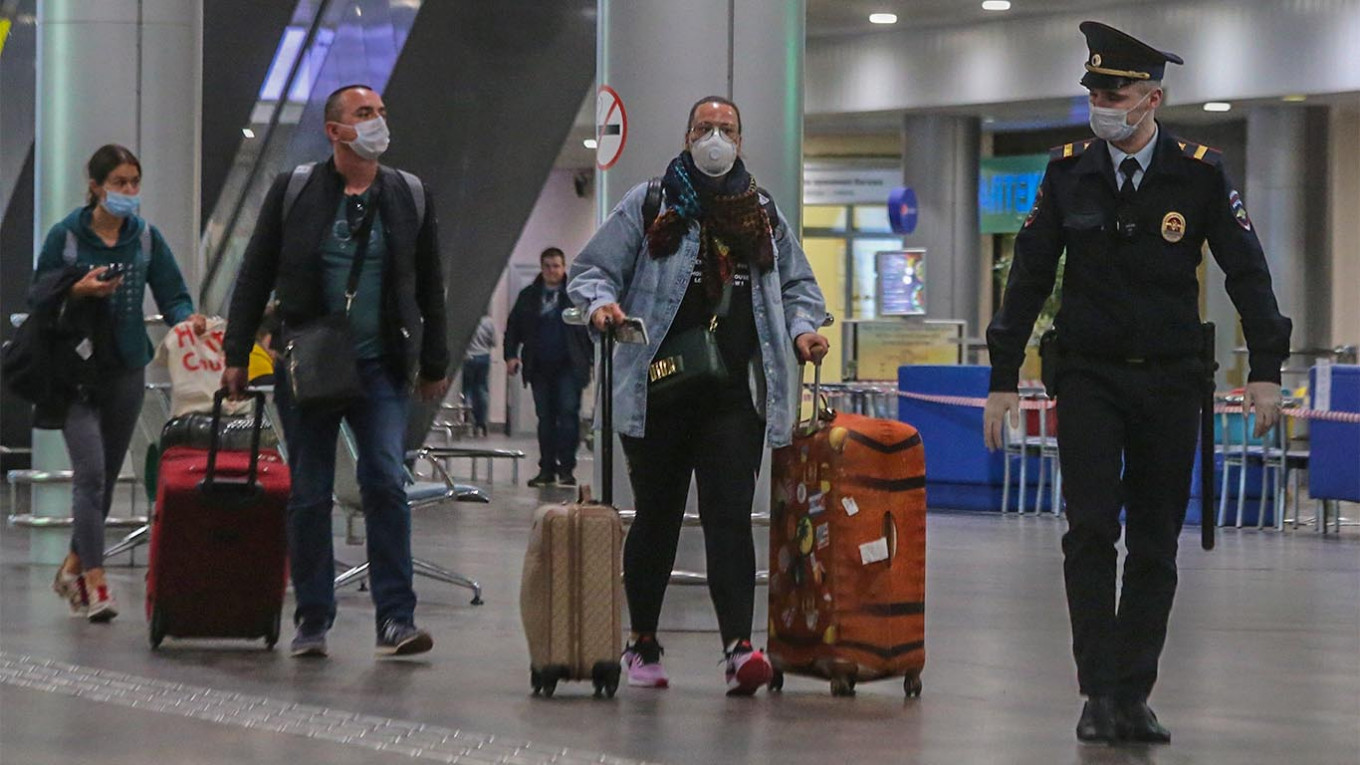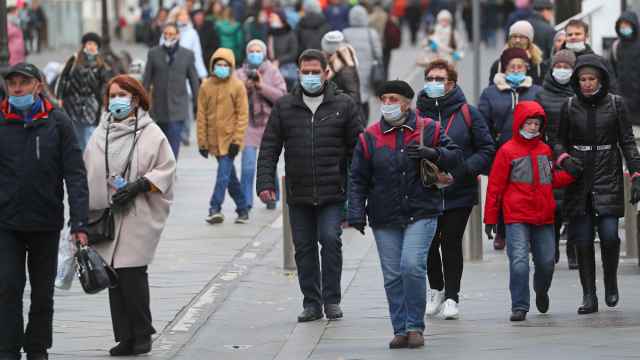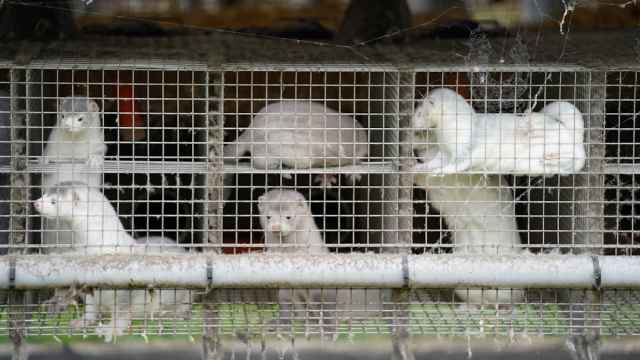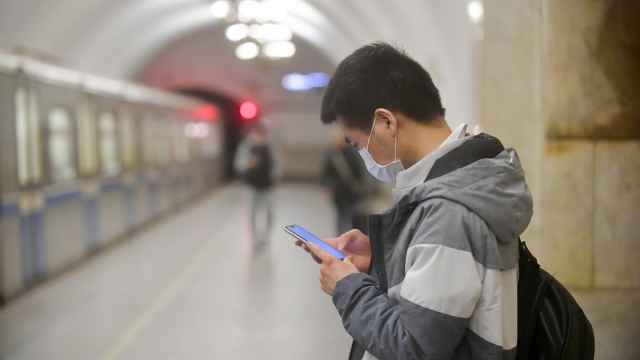On a freezing Sunday in Moscow in March, Maria Mukhina received a phone call. The 27-year-old had recently returned from London with what she thought was a winter cold, traveling through Germany and Finland in a rush to get home before Russia sealed its borders to stop the spread of the coronavirus.
Arriving at Terminal F of Moscow’s Sheremetyevo airport — the hub for all incoming flights from virus hotspots — she had her temperature checked, was swabbed and gave her details to testers in full hazmat suits. A few days later the phone rang.
“Which apartment are you in? What floor are you on? An ambulance has arrived, they’ll take you now,” said the voice at the end of the line, without introduction. Mukhina had tested positive for Covid-19, and, in line with Russia’s early response to the pandemic, was taken to Moscow’s Kommunarka hospital on the outskirts of the city for isolation until she overcame the infection.
In the weeks that followed Mukhina would face stigmatization, suspicion and harassment as she documented her experience battling the coronavirus on social media, driven by online conspiracy theories and what patients see as low understanding of the coronavirus in Russian society.
“People wrote to me saying that I was a fraud, a liar, that I was making it up to get followers. They said people like me should be burned and that I'm a disgrace to the country,” she told The Moscow Times.
Mukhina’s story is not unique. As the coronavirus pandemic sweeps across Russia at an alarming pace — the official tally of infections is almost 25,000 — Covid-19 patients find themselves fighting not only the infection, but stigma, discrimination and intimidation.
Coronavirus patients interviewed by The Moscow Times said they have been hounded by avatars and armchair epidemiologists on social media who accuse them of being paid, actors or lying to win public sympathy. At the same time, as more communities find that a virus they don’t understand is on their doorstep, the harassment is spilling into the offline world, with patients reporting bullying, intimidation and leaks of their personal data.
Stigmatization around health issues is not uncommon in Russia. Responding to one instance of online bullying of a Covid-19 sufferer in Kumertau, Bashkortostan, a local politician drew comparisons with the discrimination against HIV/AIDS sufferers in Russia, a phenomenon health experts say has exacerbated that epidemic.
“There is such an aggressive stigma [surrounding Covid-19] that people can't even leave the hospital,” Irina Kononova, deputy health minister of the region told a local radio station. “Just remember the case of HIV/AIDS, when everyone believed that the patient was to blame and shame. It is still shameful to be ill in Russia. It is shameful to go to the hospital and it is shameful to be treated.”
Fear of the unknown
In a special paper on stigma around Covid-19, the World Health Organization (WHO) said the discrimination stems from three overlapping factors. “First, it is a disease that’s new and for which there are still many unknowns. Second, we are often afraid of the unknown, and third, it is easy to associate that fear with ‘others.’”
While the WHO said anxiety is “understandable,” the harassment and bullying which stem from it exert a heavy toll on patients. The scepticism and conspiracy theories levelled against Mukhina in Moscow grew so intense that she even broadcast a live stream on Instagram from inside the hospital at 2 a.m. one night, showing her catheter in a bid to prove she really did have the virus.
“I constantly get hateful comments. I’m amazed how angry people can be. They say that I just had pneumonia, not Covid-19, as if they are my doctor or have seen my medical records. It’s very upsetting. It was really difficult for me to return home after being in the hospital, and I still worry how my neighbors will react when I bump into them,” she said.
Maria Dolgolenko, one of Moscow’s early Covid-19 cases, is another victim of the backlash. She received a barrage of abuse from parents at her son’s school after she was hospitalized. They were furious that Dolgolenko had sent her son to class when she had a fever and the family had just returned from Europe, even though she didn’t know at the time that she was infected with the coronavirus.
“They were scared, and they started this bullying. They blamed me. I was so happy that I was in the hospital, because I was scared that if I was at home they would be outside my house with stones and torches. Seriously, they were really upset,” Dolgolenko said.
In another case in Bryansk, a region close to Russia’s borders with Belarus and Ukraine, churchgoers became the victims of an angry local campaign after it emerged that one could have brought the infection from relatives in Moscow, and almost 100 have since tested positive.
Some were forced to resign from their jobs amid local anger, according to the Takie Dela news website, while locals have posted calls to burn the church to the ground online and plastered messages reading “Die, scum!” on its doors. “Everybody is acting as if we did it on purpose,” pastor Mikhail Biryukov, who was one of those who caught the virus, said in a video message recorded in hospital.
Data concerns
Patients fear leaks of their personal data could be playing a part in fuelling the reaction to local “patient zeroes” and stoking social tensions.
“This is a time when, with very good reason, healthcare providers will be providing information to the authorities about new infections. That means the authorities are going to be in control of a lot of personal confidential data about people’s health status. And this underscores the importance of keeping that data private,” Rachel Denber, deputy director of Human Rights Watch’s Europe and Central Asia Division, told The Moscow Times.
In Irkutsk, after the names and addresses of a family whose child caught Covid-19 found their way into the public domain, threats against the family in the city’s Viber chat group became so vicious that police officers were stationed outside the family’s home. Authorities say they have launched an investigation into how the family's information was made public.
In Moscow, both Mukhina and Dolgolenko slammed a highly controversial map published by Telegram channel Mash, which claims to contain the addresses of hundreds of suspected patients.
“It sets people against each other at a time when they should be joining together and supporting each other. Crazy people can do anything to a person and their relatives. It's scary. I’m outraged by the data leak, I never gave permission to publish this kind of information about me,” said Mukhina.
Dolgolenko, whose address is not in the database, said the map was “horrible,” while Human Rights Watch’s Denber called it “alarming.”
Mash has not revealed where the unverified data came from and did not respond to requests to comment for this article. The St. Petersburg version of the map claims to include addresses submitted by the public who can report when they spot neighbors being taken to hospital in ambulances.
Health stigmas
“You can definitely feel this stigmatization,” says Dolgolenko. “It’s there right now. And it’s because of this fear.”
Anastasia Jmukhadze, 38, who is currently in hospital in Moscow with suspected coronavirus said that people are being made to feel guilty about a viral disease, adding that she has seen people’s families speak to them as if they are “lepers” after a positive diagnosis.
“It’s absurd in the 21st century, but it’s happening. Victim blaming is thriving. If you’re in the hospital, you’re not sick enough to be there and you’re taking somebody else’s place. But if you stay at home, you could be spreading it to other people — there’s no place for you in society.”
Calling out such stigmatization is important in managing the pandemic, said Human Rights Watch’s Denber.
“Not only is stigmatization and bullying wrong and unlawful, it is extremely counterproductive,” she said. “It drives people to hide their illness to avoid discrimination, and drives them underground, preventing people from seeking care immediately. Therefore, the government and the authorities have a responsibility to address and condemn that behavior.”
But some patients worry that the virus’ rapid acceleration is being matched by a spread in public fear, rather than understanding.
“I’m not sure people will become less scared,” said Dolgolenko. “As the numbers of sick people grow, there’s no reason to be less scared. And it’s normal to want to blame somebody for that.”
A Message from The Moscow Times:
Dear readers,
We are facing unprecedented challenges. Russia's Prosecutor General's Office has designated The Moscow Times as an "undesirable" organization, criminalizing our work and putting our staff at risk of prosecution. This follows our earlier unjust labeling as a "foreign agent."
These actions are direct attempts to silence independent journalism in Russia. The authorities claim our work "discredits the decisions of the Russian leadership." We see things differently: we strive to provide accurate, unbiased reporting on Russia.
We, the journalists of The Moscow Times, refuse to be silenced. But to continue our work, we need your help.
Your support, no matter how small, makes a world of difference. If you can, please support us monthly starting from just $2. It's quick to set up, and every contribution makes a significant impact.
By supporting The Moscow Times, you're defending open, independent journalism in the face of repression. Thank you for standing with us.
Remind me later.







